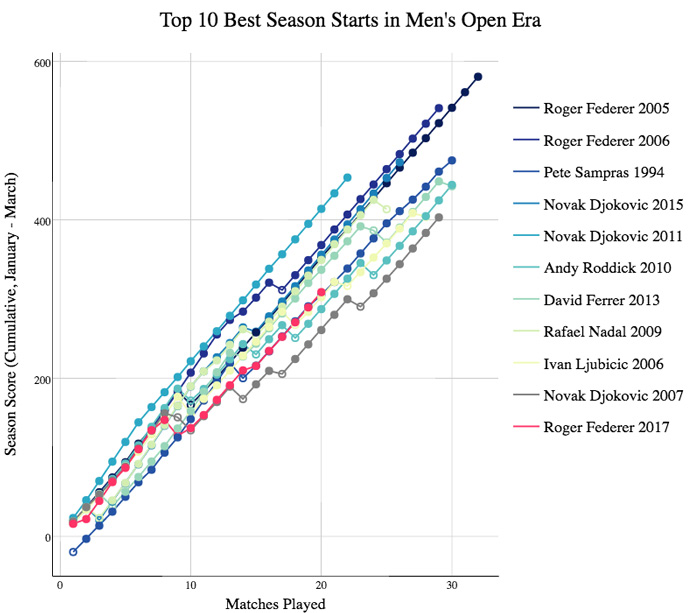After the first quarter of the 2017 season, Roger Federer has his 18th Grand Slam title and a 19-1 win record overall. Such an impressive start naturally leads us to ask: Where should we rank Federer’s 2017 start against the other seasons of his career? How does it compare to the best season starts in tennis history?
Tennis Australia’s Game Insight Group has scoured the first three months of the men’s Open Era to try to shed light on these questions. Certainly we all have our personal favourites, but we at GIG wanted to take a more objective approach to identifying the best season starts in tennis history. So we use statistics.
The actual statistic we developed is a cumulative win score that not only considers a player’s total wins and losses but also the difficulty of the opponents that they faced. Not all draws are created equal and neither are win records. We acknowledge this by giving players more credit for wins against tough opponents, and greater penalties for losses against weaker opponents.
But how exactly do we score a match result to reflect the difficulty of the opponent?
We incorporate opponent difficulty into our score by using player Elo ratings. Elo ratings are a type of power ranking that have been used throughout sport for decades. In tennis, an Elo rating is a number that reflects a player’s strength at any given time, accounting for all of the player’s career wins and losses and giving greater weight for wins over the hardest opponents, while penalizing more heavily for surprising losses. Players who have just entered the tour begin at a rating of 1500 and that grows as they add to their win record. Roger Federer’s career peak Elo was a high of 2,524, which he reached in 2007. His current Elo is 2,373.
To score a season start, we gather all match results in the first quarter of the season and give a point score to each match win and loss using an Elo-based win prediction. Players gain the most points for wins against the hardest opponents and lose the most points for losses against the weakest opponents. Because of the importance of Majors, we also increase gains and loses by 25% for Grand Slam matches.
Using this approach, we scored all men’s season starts in the Open Era and found the top 10 with the highest score at the end of the first quarter. Those 10 seasons are shown in the plot below, ranked from the first to last from top to bottom. Here, we show the cumulative score from first to last match through the month of April. For comparison, we also include the cumulative score for Roger Federer’s 2017 season.

The top two spots go to Federer’s back-to-back seasons in 2005 and 2006, where he started with a nearly flawless 31-1 and 28-1 win records, respectively. In 2005, Federer raked up 581 points for his wins by the end of the Miami Open, including finals wins over Rafael Nadal in Miami (in a repeat of this year) and three other final wins over his current coach Ivan Ljubicic. His only defeat was in the Australian Open to a strong Marat Safin.
Although Federer took the Australian Open title for the first time in 2006, his overall score for that season comes in a bit under owing to an easier AO draw in 2006 and for playing one fewer event in the first quarter than the previous year.
Some might be surprised that Djokovic’s inhuman start in 2011 doesn’t get higher than the fifth place in our list. Although Djokovic had no losses in the first quarter of that year, he played fewer events in 2011 than most other top players. On balance, going deep in one or two extra events makes for a more impressive overall performance in our scoring system, even if it comes with a late-stage loss.
Others might wonder why past legends like Jimmy Connors or Guillermo Vilas don’t feature among the best starts. Though some of the top players in the first decades of the Open Era played extensively, there are two main reasons that the top players in the past 20 years tend to rise to the top by comparison with out scoring system. First, the Australian Open wasn’t regularly on the schedule of many overseas players until the 1990s. Second, the depth of the men’s game has generally improved over time and the depth in Elo ratings today just doesn’t compare to what it was 30 years ago. So, even though Jimmy Connors won 40 matches by the end of the first quarter in 1974, his total season score was just 406.
Read more about this at Steph’s blog, on-the-t.com
30 December 2019
Nick Kyrgios’ first-round win over Andrey Rublev at last year’s Kremlin Cup in Moscow ... More
23 February 2016
Tennis is a funny old game. People love you one minute and then want to drop you the next;... More
24 November 2016
Novak Djokovic is the fastest tennis player on the planet, according to new data from Tenn... More
18 January 2016
Shot charts are critical in understanding a player’s on court behaviour. They have becom... More